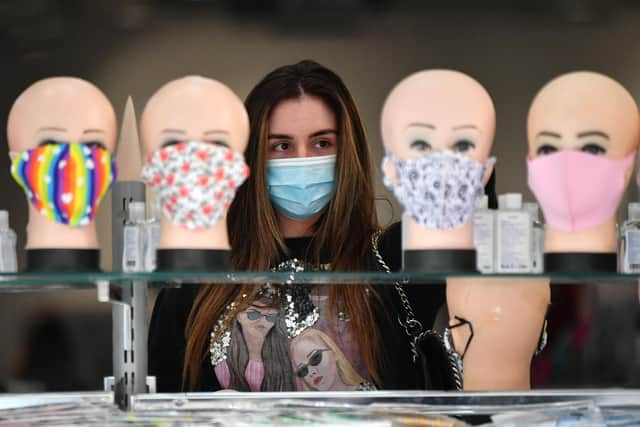Masks 'tremendously effective' at curbing Covid-19 spread
and live on Freeview channel 276
A new study by scientists at the University of Edinburgh has found face coverings can block out 99.9 per cent of potentially lethal droplets expelled when an infected person coughs or talks.
The findings show that a person is exposed to 10,000 times more particles from a person who coughs with their face uncovered while standing two metres away than from someone half a metre away who is wearing a mask.
Advertisement
Hide AdAdvertisement
Hide AdLead researcher Dr Ignazio Maria Viola, of the University of Edinburgh’s School of Engineering, said: “We knew face masks of various materials are effective to a different extent in filtering small droplets.


“However, when we looked specifically at those larger droplets that are thought to be the most dangerous we discovered that even the simplest handmade single-layer cotton mask is tremendously effective.
“Therefore wearing a face mask can really make a difference.”
Scientists at the university compared the number of droplets that landed on a surface in front of a person coughing and speaking with and without a surgical mask or a basic cotton face covering.
Advertisement
Hide AdAdvertisement
Hide AdTests were carried out on people and a life-sized anatomical human model connected to a machine that simulates coughs and speech.
Analysis found that the number of droplets was more than 1,000 times lower when wearing even a single layer cotton mask, the researchers say.
“The simple message from our research is that face masks work,” said Professor Paul Digard, of the University of Edinburgh’s Roslin Institute.
“Wearing a face covering will reduce the probability that someone unknowingly infected with the virus will pass it on.”
Advertisement
Hide AdAdvertisement
Hide AdAccording to the scientists, their results contrast with previous research that has suggested face coverings offer less protection against the virus.
For bigger droplets carrying the largest amount of virus, they say masks are extremely effective in reducing spread to the immediate surroundings.
However, the experiments also measured small droplets – known as aerosols – which can remain airborne for hours.
How much virus transmission takes place by aerosol is still not known, but the team has warned that if it is found to be significant then the new findings overestimate the protective effects of face coverings.
Advertisement
Hide AdAdvertisement
Hide AdDame Ottoline Leyser, chief executive at UK Research and Innovation (UKRI), said: “The Covid-19 pandemic is a crisis that has impacted virtually everybody.
“In these extraordinary circumstances we have seen the value of rapid and collaborative research in supporting our response to the crisis.
“The findings published today from a study led by researchers at the University of Edinburgh and co-funded by UKRI support the growing body of evidence that face coverings reduce Covid-19 transmission via respiratory droplets.
“Research into Covid-19 is obviously a relatively new field, with the science still evolving.
Advertisement
Hide AdAdvertisement
Hide Ad“New information about the virus plays a crucial role in informing policy-makers and the public.”
The study was funded by the Engineering and Physical Sciences Research Council, the Biotechnology and Biological Sciences Research Council, the European Commission and Japan Student Services Organisation.
A message from the Editor:
Thank you for reading this story on our website. While I have your attention, I also have an important request to make of you.
The dramatic events of 2020 are having a major impact on many of our advertisers - and consequently the revenue we receive. We are now more reliant than ever on you taking out a digital subscription to support our journalism.
Advertisement
Hide AdAdvertisement
Hide AdSubscribe to scotsman.com and enjoy unlimited access to Scottish news and information online and on our app. Visit https://www.scotsman.com/subscriptions now to sign up.
By supporting us, we are able to support you in providing trusted, fact-checked content for this website.
Joy Yates
Editorial Director
Comment Guidelines
National World encourages reader discussion on our stories. User feedback, insights and back-and-forth exchanges add a rich layer of context to reporting. Please review our Community Guidelines before commenting.